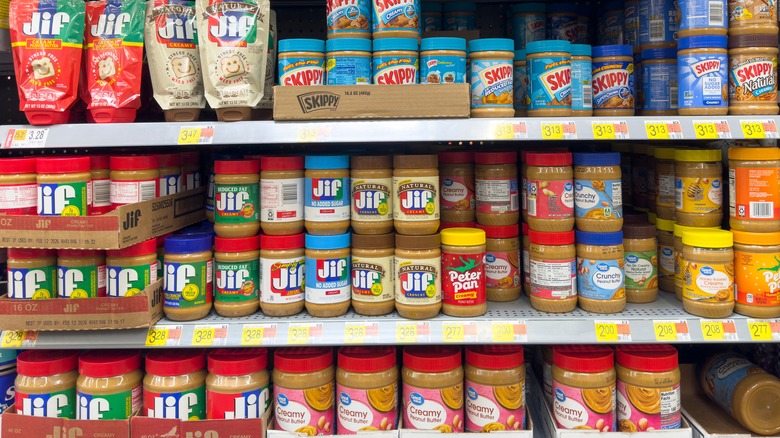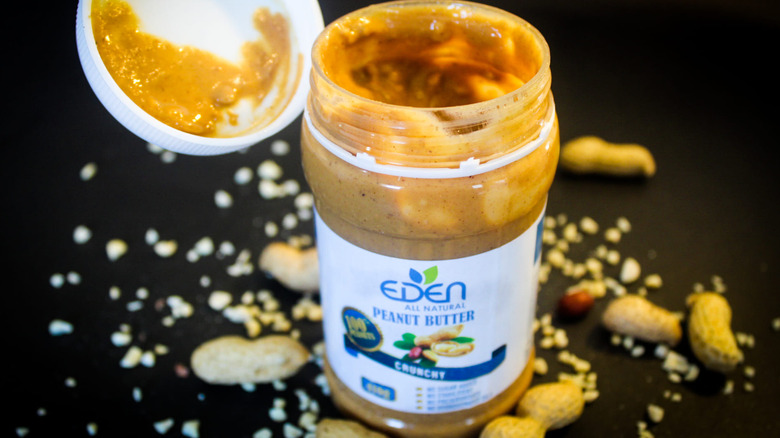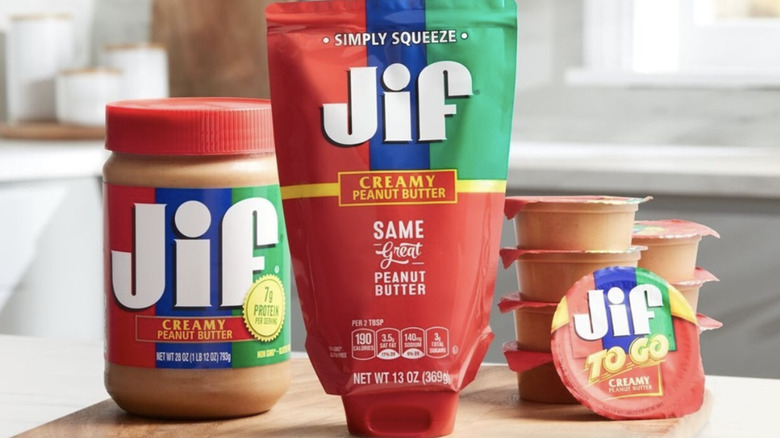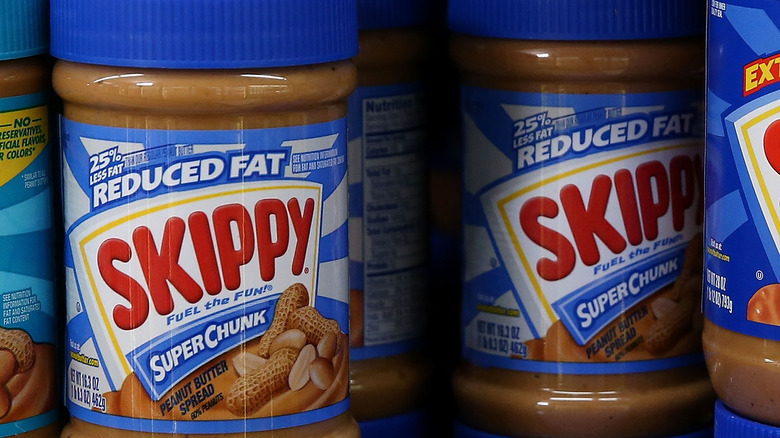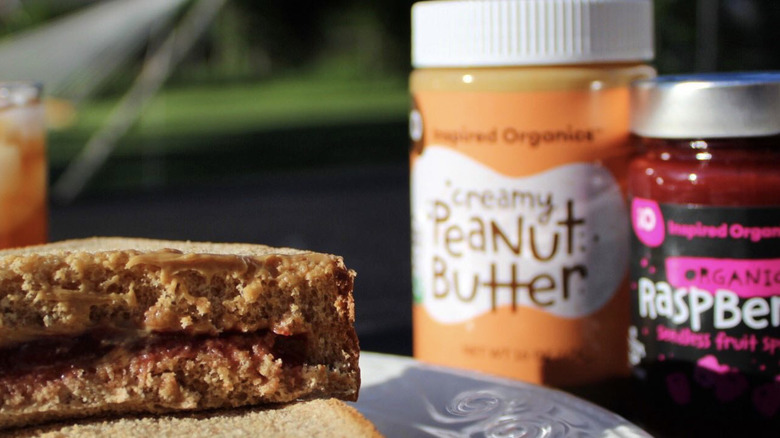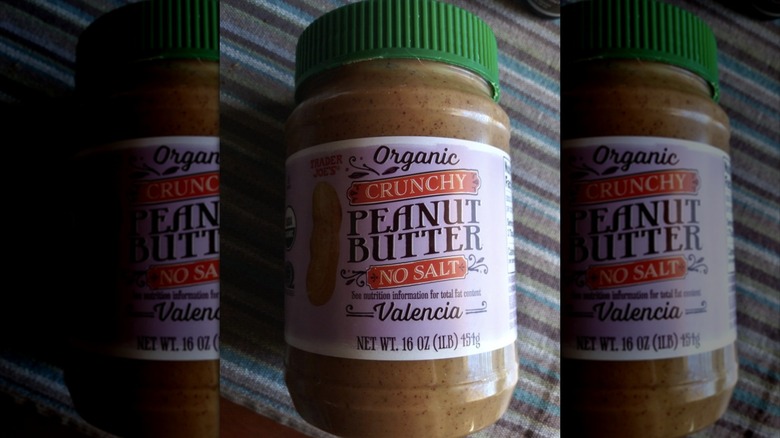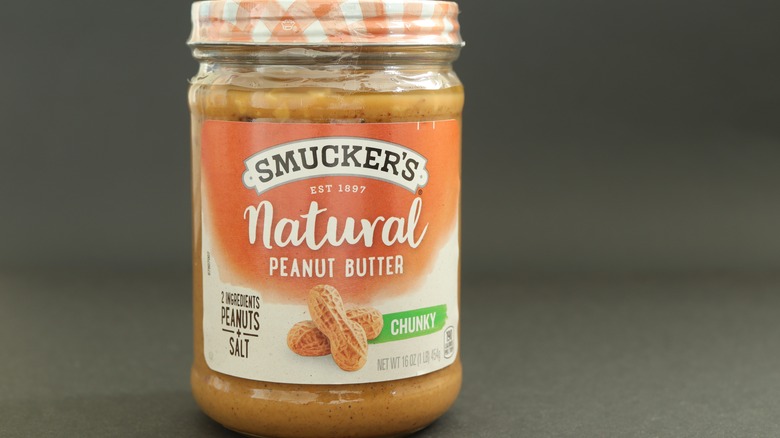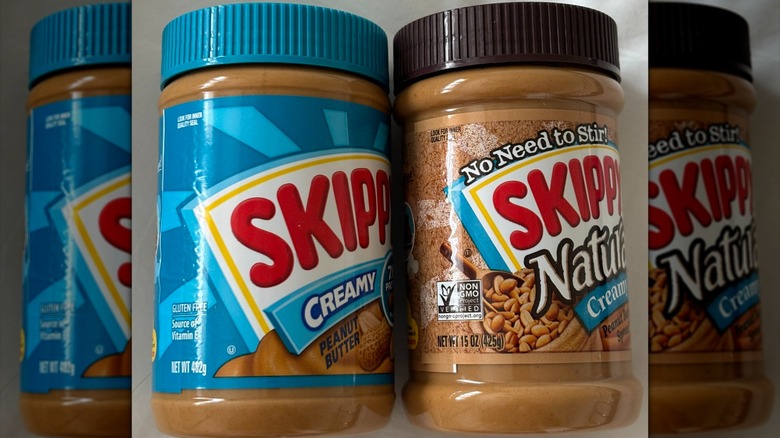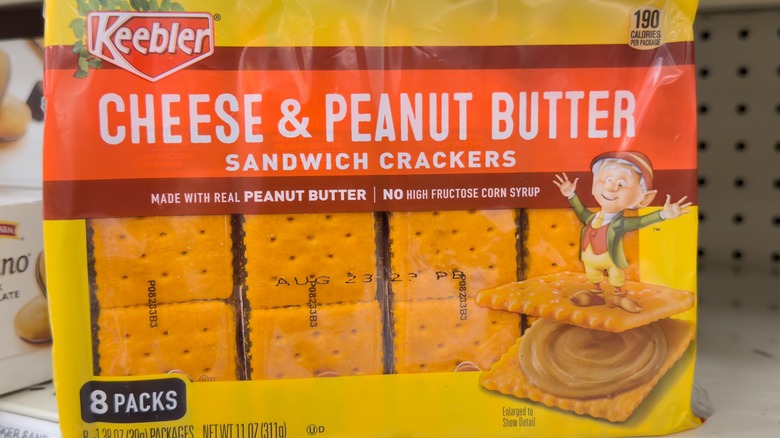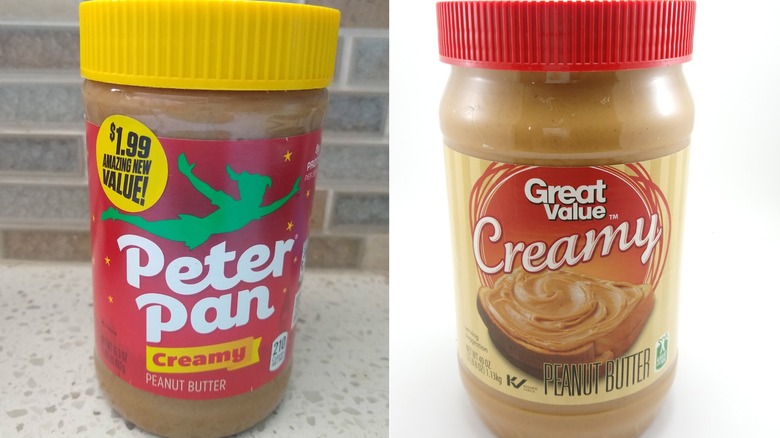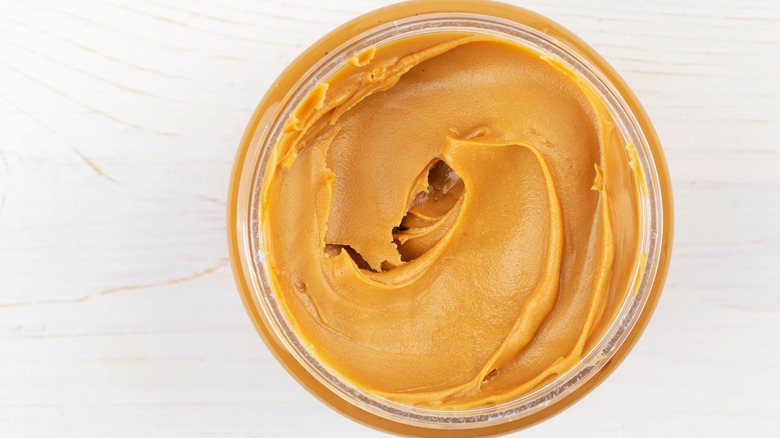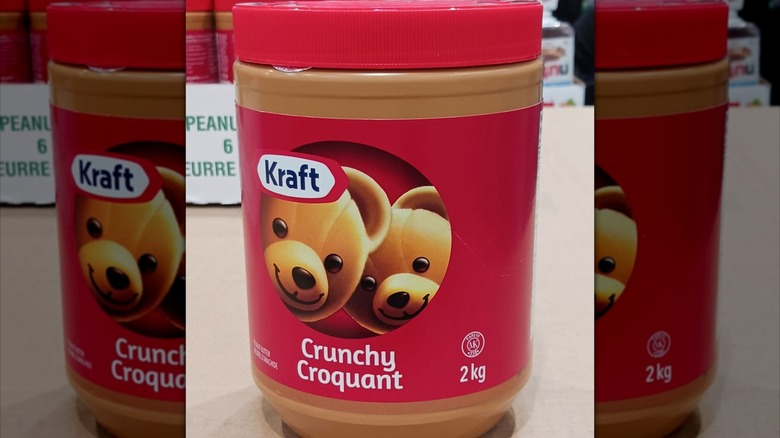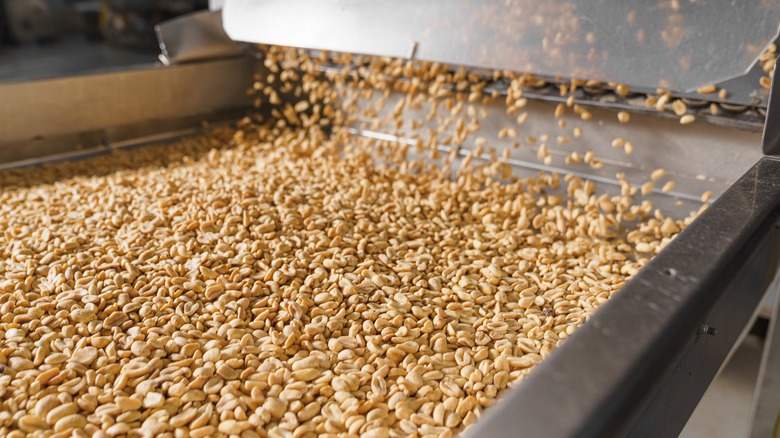The Biggest Recalls In Peanut Butter History
We may receive a commission on purchases made from links.
Peanut butter is a great source of protein, profoundly versatile, and just plain delicious. When we talk about the dangers of peanut butter, it's usually in regard to the serious, sometimes fatal allergic reactions it can cause. Sadly, people without peanut allergies have died from eating peanut butter. These tragic and avoidable deaths, along with hundreds of reported illnesses are associated with some of the biggest peanut butter recalls to ever happen. A couple of them even ended up being some of the largest food recalls in history.
Peanut butter production in the U.S. is a massive operation that involves around 1.5 millions tons of peanuts per year. Peanut butter is found in countless food products, including candy, condiments, granola bars, and protein shakes. Quality control regulations and industrial standards in the U.S. peanut industry are strictly enforced by the United States Department of Agriculture (USDA) and the Food and Drug Association (FDA), but when an issue at the manufacturing stage gets overlooked, consumers can wind up getting sick from eating all kinds of different foods.
In the past, peanut butter recalls haven't happened quickly enough, leaving hordes of well-meaning consumers vulnerable. Contaminated peanut butter consumption has been responsible for devastating public health scares — exposing a darker side of the peanut business. These are some of the biggest peanut butter recalls to ever hit the history books.
House of Natural Butters peanut butter in 2024
The United States isn't alone in grappling with peanut butter recalls. As of October 2024, the most substantial peanut butter recall of the year happened in South Africa, with all of the products having production ties to House of Natural Butters. In early February, supermarket chain Pick n Pay recalled its No Name brand of smooth peanut butter, as well as smooth and crunchy peanut butter varieties from Eden All Natural. Grocers Faithful to Nature and Takealot also removed Eden all Natural peanut butter from its shelves. Standard testing of Eden All Natural's product showed unlawfully high levels of aflatoxin, a dangerous metabolite produced by mold or fungus that grows on crops or in soil.
About a week after Pick N Pay's national recall, other South African grocery chains followed suit. Dischem recalled smooth and crunchy peanut butters sold under the Dischem's Lifestyle brand. Clicks and Wazoogles Superfoods also stripped peanut butters from circulation. Although aflatoxins occur naturally in the environment, they are carcinogenic when eaten by humans or animals and pose a specific risk for liver cancer. Aflatoxins can also cause nausea, vomiting, and stomach pain.
As an investigation by the National Consumer Commission (NCC) unfolded, more brands were affected. Eat Naked peanut butter and Woolworth's peanut butter ice cream were recalled. Clover pulled 10,776 units of Go Nuts peanut butter for high aflatoxin levels. As alarming and widespread as the recall was, no related illnesses were reported.
Jif peanut butter in 2022
The peanut butter giant Jif was the name on everyone's lips in 2022, for reasons every food brand hopes to avoid. Jif is made by American peanut butter company J.M. Smucker. In May 2022, a J.M. Smucker facility in Lexington, Kentucky that produced Jif peanut butter was to blame for a salmonella outbreak that affected 17 states. Early in the investigation, nearly all of the individuals who fell ill reported eating Jif peanut butter. The FDA used Whole Genome Sequencing to match an environmental sample previously taken from J.M. Smucker's Lexington facility with the Salmonella Senftenberg serotype responsible for the multi-state outbreak.
Jif wasted no time voluntarily recalling 49 SKUs of peanut butter. The company stated that a faulty piece of equipment may have allowed water to enter the production environment, creating a breeding ground for salmonella bacteria. Although Jif vowed to destroy all affected units, the scope of the recall was just getting started.
One day after Jif's May 20th recall announcement, Wawa recalled its apple & peanut butter dipper snack, which contained Jif. It set off a domino effect, causing a total of 20 brands to recall sweets and store-prepared foods that Jif peanut butter had compromised. Jif's recall accounted for 21 reported illnesses and four hospitalizations, and the ordeal cost J.M. Smucker an estimated $125 million.
Skippy peanut butter in 2022
Skippy peanut butter was America's top–selling brand for over 30 years and remains an industry leader today, so it was disconcerting to many when the brand had a large-volume recall in 2022. The Class II recall was voluntarily initiated by Skippy on March 30, 2022 due to the risk of some peanut butter jars containing small fragments of stainless steel. Skippy's unintended ingredient came from a small piece of manufacturing equipment falling into the peanut butter during a mechanical repair.
Right off the bat, Skippy stressed that the metal-meets-peanut butter incident constituted a very limited recall. This was a partial truth. The recall was limited in the sense that it only affected offshoot varieties of the brand's regular peanut butter: Skippy Reduced Fat Peanut Butter (both creamy and chunky textures) and Skippy Creamy Peanut Butter Blended With Plant Protein. That said, these peanut butter jars were recalled in massive quantities. The recalled peanut butter totaled 9,353 cases — or 161,692 pounds — of product distributed throughout 19 states. Call it "limited" if you want Skippy, but that's a lot of peanut butter.
No reported injuries stemmed from the 2022 Skippy recall. The company arranged for consumers who purchased the afflicted peanut butter to exchange it or receive a refund. Skippy continued to emphasize that quality control was central to its peanut butter production process — except this wasn't the only time things went amiss at the Skippy factory.
2018 Inspired Organics LLC nut butters in 2018
With a name like Inspired Organics, what could go wrong? Quite a bit it turns out — something the Michigan-based company learned after a significant nut and seed butter recall in December 2018. Initially, Inspired Organics LLC's product recall was exclusive to sunflower butter. The sunflower butter recall was issued after testing performed by Michigan Department of Agriculture and Rural Development (MDARD) came back positive for Listeria monocytogenes. Days later, Inspired Organics tested its almond butter and detected the presence of Listeria monocytogenes. The recall was expanded.
Lipari Foods LLC out of Warren, Michigan distributed jars of Inspired Organics' listeria-tainted products to multiple retailers in 13 states and Ontario, Canada. Unfortunately, this wasn't where the product recall ended. Three days after the recall expansion, Inspired Organics also pulled its peanut butter and tahini butter off the shelves. The products, manufactured by Oskri Corporation in Lake Mills, Wisconsin were sold in a total of 15 states and in Ontario, Canada. Studies have shown that listeria bacteria can survive on various seeds for up to six months and on nuts and legumes (like peanuts) for 12 months or more.
Inspired Organics' nut butter recall opened the floodgates on Oskri's Lake Mills production facility. By January 2019, over 40 other nut and seed products produced at the plant were recalled due to the listeria risk. Come March 2019, Oskri's Lake Mills plant appeared to be closed.
Sunland Inc. peanut butter in 2012
New Mexico-based manufacturer Sunland inc. issued a recall in September 2012 for its almond butter and peanut butter products. A multi-state outbreak of the Salmonella Bredeney serotype tearing its way through 18 states was linked to Sunland Inc. One culprit of the reported illnesses was Trader Joe's Valencia Peanut Butter. It would end up being just one of many products roped into the huge recall, and in early October, Sunland Inc. expanded the recall to include all of its peanut products. It was a decision that would earmark the beginning of the end for the once prosperous company.
In November 2012, the situation got even more grave. As the continuing recall expansion on Sunland's products reached 240 products, the FDA suspended Sunland Inc. from distributing anymore peanut products under the Food Safety Modernization Act of 2011. It was the first manufacturer to be hit with this newly acquired reach of the law. At that point, 42 illnesses were reported amongst 20 states, and over half of the individuals were children under the age of 10. The public health disaster was too much for Sunland Inc. to handle, so in October 2013, the company filed for Chapter 7 bankruptcy protection and closed its doors that month.
Smucker's Natural chunky peanut butter in 2011
The J.M. Smucker Company has been making spreads since the 1890s, but its long history of feeding America has had some low points. A 2011 recall for Smucker's Natural Chunky Peanut Butter was one of them. Routine testing revealed that this specific variety of Smucker's peanut butter contained salmonella bacterium, and the troubling data left J.M. Smucker no choice but to issue a recall for all 16-ounce jars of its Natural Chunky Peanut Butter sold between November 8 and 17, 2011.
As a leading peanut butter brand, it was of little surprise that the potentially contaminated product had been shipped to 24 states. On the upside, no illnesses were reported in relation to the recall. Still, the salmonella contamination resulted in 1,619 cases of Smucker's Natural Chunky Peanut Butter being deemed as unsafe for consumption. With 12 jars per case, that meant Smuckers had to recall 19,428 jars of product. The J.M. Smucker Company would bounce back from the unsettling situation — but it would not be the last time it dealt with a multi-state peanut butter recall.
Skippy peanut butter in 2011
In March 2011, results from routine internal testing at the Skippy factory in Little Rock, Arkansas led to a dangerous discovery: there was salmonella in the peanut butter. The bacteria was found in Skippy Reduced Fat Creamy Peanut Butter Spread and Skippy Reduced Fat Super Chunk Peanut Butter Spread. The 16.3-ounce jars of tainted peanut butter had already been shipped to 16 states, prompting Unilever United States Inc. — Skippy's parent company at the time — to initiate a voluntary recall.
Although just two types of Skippy's peanut butter were implicated in the recall, a lot of them were made with the bacteria-laced product. A total of 64,020 units had to be recalled in the name of public safety. No illnesses were reported in the wake of the Skippy recall, and the brand still managed to pull off $300 million in sales that year. The scare may have left Unilever with a bad taste in its mouth, and less than two years later, they sold Skippy to Hormel Foods Corp for $700 million. Hormel has owned Skippy ever since.
Peanut Corporation of America in 2008 and 2009
The Peanut Corporation of America (PCA) recall is one of the most notorious food recalls ever. In November 2008, the Centers for Disease Control and Prevention (CDC) began investigating a 12-state cluster of Salmonella Typhimurium cases that was rapidly increasing. In January 2009, the outbreak was traced to five-pound containers of King Nut peanut butter used by cafeterias and food manufacturers. King Nut was made in PCA's Blakely, Georgia facility.
King Nut peanut butter wasn't sold directly to consumers, but people ate it under different names and in many different products. In January 2009, Kellogg recalled its Austin and Keebler peanut butter crackers. Later that month, PCA recalled all products manufactured in the Georgia plant since January 1, 2007. In February 2009, the company shut down. The Salmonella Typhimurium outbreak that PCA caused sickened 714 people in 46 states and one in Canada. Nine people died.
Over 3,900 products were recalled in connection to PCA's products. An FDA investigation uncovered 12 instances between 2007 and 2009 when PCA shipped products before receiving test results that were positive for Salmonella, and emails sent by PCA's owner Stewart Parnell revealed a long history of cutting corners and defrauding customers. PCA was ordered to pay victims of the outbreak $12 million. In 2015, Stewart Parnell was sentenced to 28 years in prison, the largest criminal sentence ever given in a food safety case. His brother Michael Parnell is also serving 20 years for his role in the deadly recall.
Peter Pan and Great Value peanut butter in 2006 and 2007
One of the biggest peanut butter recalls in history was the ConAgra Foods salmonella crisis, beginning in November 2006. The CDC worked with public health officials in several states where illnesses from the Salmonella serotype Tennessee were on the rise. After an exhaustive interviewing process of the ill individuals, investigators linked the salmonellosis cases to two peanut butter brands: Peter Pan and the Walmart label, Great Value. Both were produced at a ConAgra facility in Sylvester Georgia. It was the first time in the U.S. that peanut butter was the cause of a salmonella outbreak.
The FDA warned the public not to consume Peter Pan or Great value peanut butter with product code beginning in "2111" due to potential contamination. On February 14, 2007, ConAgra ceased production at the Georgia plant and voluntarily recalled all peanut butter produced there since January 2004, — a quantity totaling 326 million pounds. Unsurprisingly, conditions at the facility were not up to FDA standards.
A leaky roof, malfunctioning sprinkler system, storm-damaged silo, and a faulty peanut roaster all contributed to a bacteria-friendly environment. Twice in October 2004, routine testing came back positive for salmonella in ConAgra peanut butter, but the company claimed its employees didn't read the tests correctly. ConAgra's egregious oversights caused 714 reported illnesses in 47 states and likely thousands more. In 2016, ConAgra pled guilty to a criminal charge of shipping contaminated peanut butter across state lines and paid an $11 million settlement.
Winn Dixie peanut butter in 2003
The peanut butter shelves at Winn Dixie were emptier than usual in May 2003, when the supermarket chain recalled its private label Deep South peanut butter due to impermissible levels of aflatoxin, a dangerous mycotoxin strain produced by mold. Ingesting aflatoxins, especially long-term, is life-threatening to animals and can cause cancer or liver disease in humans. In 2003, the FDA regulations limited the presence of aflatoxins in food and animal feed to 20 parts per billion (pbb), a level that remains the same today.
When testing of Winn Dixie's Deep South peanut butter showed elevated aflatoxin levels, a huge amount of product was included in the Class II recall. In total, 223,081 pounds of Deep South were deemed unsafe for consumption. Deep South peanut butter's days at Winn Dixie were numbered anyway. The chain retired the use of its Deep South private label in 2003, despite it being the first of Winn Dixie's numerous store-brand names, debuting in 1956. It would not be Winn Dixie's final aflatoxin scare though. In October 2020, Winn Dixie recalled Whiskers-and-Tails dog food due to high levels of aflatoxin contamination.
Kraft peanut butter in 1996
Kraft Australia was in unknown territory in June 1996, when the Victorian Department of Human Services traced Kraft peanut butter to a salmonella food poisoning investigation. The scary circumstances compelled Kraft to recall eight varieties of its peanut butter on June 23, 1996. Three days later, two more varieties were recalled. On June 30th, Kraft expanded the recall again, and took all of its peanut butter off of the market.
Kraft had no blueprint to navigate the situation. There had never been a peanut butter recall attributed to salmonella contamination before, and it left the public confused and scared. Kraft was accused of being slow to address consumer risk when the problem was brought to light. Around 500 salmonella cases were connected to the peanut butter recall. As a result, Kraft's financial deficit was an estimated $15 million, and a class action lawsuit was levied against Kraft, which contained 540 complainants.
The death of a 72-year-old man about a month before the recall was linked to Kraft's tainted peanut butter when the autopsy showed salmonella pathogens in his lungs. After months of investigating, researchers surmised that the likely source of salmonella arose from a bad judgment call by Kraft's peanut supplier, Peanut Company of Australia. The company moved large batches of peanuts with an auger that had been stored in a mouse-infested tool yard. The auger, which was almost certainly contaminated by mice feces, was not properly sanitized before coming into contact with the peanuts.
Peanut Corporation of America in 1990
The Peanut Corporation of America (PCA) went down in a blaze of catastrophic shame and bankruptcy in 2009, but it was first opened in 1977, as a rural, family-owned, peanut roasting plant. Founders Hugh Parnell and his son Stewart built PCA into a multi-million dollar company, selling its peanut products to huge brands like Little Debbie, Kellogg, and Sara Lee. As admirable as PCA's rise to prominence seemed, its undoing in 2009 was not the first recall scandal weathered by the infamous brand, with trouble striking them as far back as 1990.
In PCA's former Gorman, Texas plant — where father and son grew their business from the ground up — federally-appointed testers detected unlawfully high levels of aflatoxin in PCA peanut butter. A month later, PCA sent a recall notice to its clients, but it was not a seamless transaction. American Candy Co. had purchased hundreds of 50-pound cases of PCA peanut butter and turned them into roughly 8,000 cases of peanut butter kisses intended for sale at Walmart. The aflatoxin recall prevented American Candy Co. from selling any sweets made with PCA's toxic lot.
American Candy Co. sued PCA, which settled to the tune of $90,000 in 1993. It wasn't the only lawsuit that stemmed from the aflatoxin debacle. Zachary Confections Inc. also sued PCA, claiming a shipment of peanuts contained impermissible levels of aflatoxin. That case was also settled, though the amount was undisclosed.
